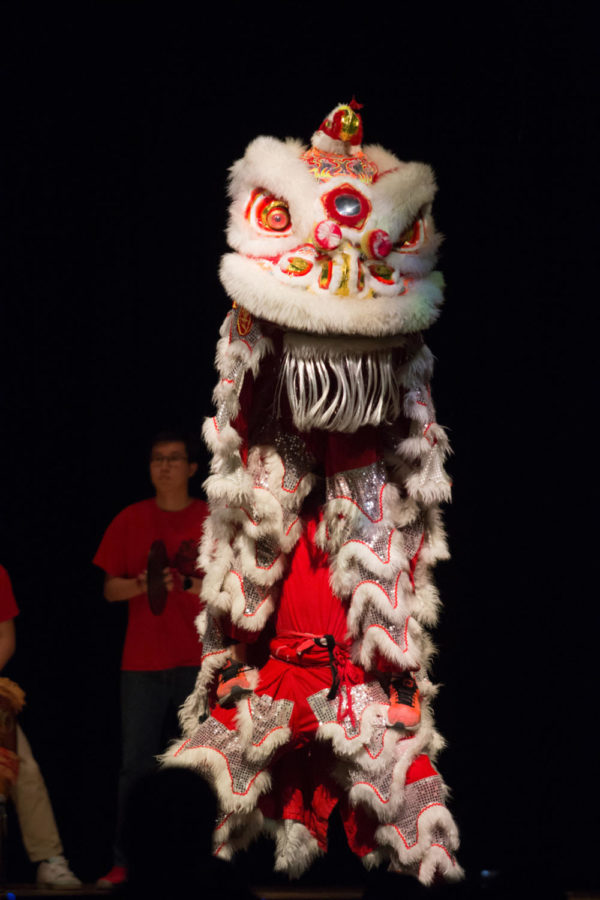新年快乐 (Happy New Year) from home to Ames
Students perform a traditional Chinese dragon dance during the Spring Festival Gala in the Memorial Union on Feb. 7. The annual event featured a variety of acts including comedy skits, dances, and musical performances.
January 26, 2017
Chinese New Year is a holiday over 4,000-years-old that is rich in culture and tradition. The Chinese New Year is also called the “Spring Festival,” as it begins on the first new moon closest to the beginning of spring.
Chinese culture uses the lunar calendar. Months are measured by phases of the moon in the lunar calendar, and therefore, the date of the new year falls upon different days every year on the western calendar system. This year it happens to land on Jan. 28.
2017 is the year of the rooster — No. 10 in the 12-year Chinese Zodiac cycle. Roosters are known to be very reliable, independent, meticulous, punctual and outgoing. While they do have many positives, they can also sometimes be overconfident, eccentric and perhaps even arrogant.
Specifically, 2017 is the year of the Fire Rooster, with the last being in 1957. There are four other types of Roosters — earth, gold, wood and water. Fire Roosters are known to be exceptionally trustworthy and punctual. Other Rooster years include 1933, 1945, 1957, 1969, 1981, 1993, 2005, 2017 and 2029.
Festivities for the new year in Chinese culture will begin Friday on New Year’s Eve and continue through late next week.
Traditions include dragon dances, fireworks and giving gifts. Another very sacred tradition is families joining together for a special dinner on New Year’s Eve. They reunite to eat, catch up and reflect on the past year. Some families will even clean the house as a symbol of good fortune for the coming year.
Other popular festivities include giving “hong bao.” Hong bao is a red envelope that generally has money inside. Nowadays, gift cards or similar items are sometimes substituted. Hong bao apps are even available for gifting electronically.
The highly acclaimed “Spring Festival Gala” — a huge festival hosted by celebrities that includes performances by musicians, magicians, acrobats, comedians and more — will be broadcast live on TV. It also will be streamed live online.
While many international students on campus are celebrating the new year, it is not feasible to travel back home for the holiday. When several were asked about how they planned to celebrate, they had varying ideas.
Xinzhe Chen, freshman in agronomy, plans to celebrate at the Spring Festival Gala event at 6 p.m. Sunday in the Memorial Union.
“I think this time of year, many Chinese students miss their family,” Chen said. “[Chinese New year] is very special. The holiday is a reunion. You get to see family and friends that you cannot see normally.”
Chen said it’s emotionally taxing on some international students who don’t get to see their family often.
Another student is planning to have a Skype call with his family the night of to stave off some of the homesickness.
Chufu Zhou, junior in electrical engineering, is very busy and has many tests to study for. He is unable to celebrate with friends but looks forward to a video call with his family. He also plans to watch the Spring Festival Gala.
“For me, [the best part] has to be the food,” Zhou said. “I like eating. Every single time.”
Zhou also said the Chinese New Year is the most important of all of the holidays in Chinese culture, and the dinner on Chinese New Year is perhaps the most important of all of the traditions.
One popular dish for the holiday is the tangyuan. Tangyuan are sweet boiled dumplings made of rice flour, sesame and sugar. Sometimes they are even stuffed. Eating fish is also a symbol of good fortune in the coming year.
Dumplings (jiaozi) are popular because they are shaped like the old Chinese currency, and the more one eats on New Year’s, the more money they will make that next year. Long noodles (mein tao) are common as well to represent longevity.
Haley Kong, senior in elementary education, has different plans. She plans to get together and celebrate with friends. In her Peranakan culture, there is much more homage paid to ancestors, and families will even pray to them on New Year’s.
But Kong does not practice this. Elder family members will generally bless the younger and will often give them hong bao. Hong bao are traditionally only given by married relatives to younger, single relatives.
When asked about similarities between western New Year’s and Chinese New Year, Chen said there weren’t many.
“I think Americans and Chinese students should communicate more,” Chen said. “We should experience each other’s culture.”
When students of different cultures share one campus, they often socialize with people of their culture. Chen thinks that if students communicated more openly and were open to experiencing each other’s cultures, the campus would be a much more unified place. Students would be able to appreciate other cultures while still practicing their own.
Chinese New Year is a highly anticipated event with culturally rich traditions from dances and television shows to feasts and fireworks. The holiday is so important to international students that those traditions are making their way into the Iowa State campus and finding alternative ways to celebrate.







